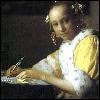
Yesterday I re-watched
The Constant Gardener, a film I loved when it was released a few years ago.
Based on a novel by John Le Carré,
The Constant Gardener could be described as a political thriller, or as belonging to social realism, but I don't think it is the most interesting side of the movie, and there isn't much suspense at the end of the day. Yes there are murders and there's a conspiracy; corruption is pointed out on the highest levels, the plot shows the collusion between the Foreign Office and multinational firms to the detriment of the most vulnerable populations, how fragile humanitarian action is and how commercial interest overcomes helpless NGOs. The film denounces powerful white men using black countries, people ready to do anything to save millions of $, all sort of compromises with one's conscience. The malpractice of major pharmaceutical companies and neocolonialism are indeed the context of the film if not the framework. Sadly, unless you live under a rock, there's nothing really new under the sun...especially in Africa. If there's a message here, it isn't a new one either. But I think that the movie is much more than a film with a message on capitalism and free-market globalization.
First, there's the undisputable artistic side; you can tell that Fernando Meirelles worked on the form. The cinematography is excellent. There's a nice contrast between the documentary-like style of the movie– the use of hand-held camera sequences and webcam pictures, and the breathtaking beauty of certain African landscapes (especially at the end of the movie, at the Lake). The main protagonists in the story, Ralph Fiennes playing Justin and Rachel Weisz playing his wife Tessa, are beautiful too. She's a social activist, he's a shy diplomat. Thanks to flashbacks we get to see their meeting, and glimpses of their life together. The shaky camera, that follows their journey in Africa, provides a feeling of urgency and plays on the character's paranoia, goes very soft and gentle when we leave the outer world to get into their intimacy, creating a cocoon.
The romance isn't a minor detail, it is what makes of
The Constant Gardener, a special film and a beautiful one. I haven't read the book, but it seems that there's always a romantic motive in John Le Carré's stories and it's often what shines in the adaptations on screen. For instance Sean Connery and Michelle Pfeiffer were a great couple in
The Russia House (if you wanna see the most beautiful declaration of love on screen, watch that movie!).
The Constant Gardener has flaws of course, Africa may be a bit too colourful (while England is grey and cold)and the director indulges with many visuals to cause an impact, but it does tell a moving love story.
To me, the movie first and foremost tells Justin's personal journey and a story about that improbable couple, about how loving someone doesn't mean you can share everything or understand exactly the other's own world. The relationship between Tessa and Justin is really touching. My favourite parts were when he filmed her, as she was in a tub, with the webcam, pretending to be Le Commandant Cousteau, and later when he discovered a file in which there was a clip she had made with the same webcam, featuring him asleep, probably dreaming of ...weeds!
Justin is a man, but his name reminded me of Sade's heroin, Justine.
He's a straight-forward man, a virtuous person, but there are many vicious and nasty people around him and he slowly realizes it. Actually Justin is really a mix of Sade's heroin and Voltaire's Candide. He's naive and quiet, a pure gentle man. Ralph Fiennes is simply excellent. His face is open and conveyes such kindness. Rachel Weisz is also perfect, entrancing(the flashbacks put the viewers in Justin's shoes and make them fall in love with Tessa along with him), vibrant and yet like from another world, fleeting and almost iconic, which makes sense since we discovered her through flashbacks after she's died at the beginning of the film.
In my opinion, Justin's journey isn't a journey towards truth or justice. It's a journey towards his wife–so the ending does make sense– and a journey towards the "real" world and far from innocence and stock thoughts. It is a new version of
Candide by Voltaire. Between optimism and pessimism, Justin didn't really "choose" (even though he couldn't help even one kid when he wanted to, because of the U.N's rules, which is kinda depressing), or rather he chose loving which might be the more down-to-earth option eventually. But choosing love doesn't necessary lead to a happy ending, and Justin is running towards self-destruction. Nothing melodramatic here, but a bit of tragedy since our heroes are crushed by the forces of modern gods.
At the beginning of the film, Justin Quayle is forced to leave his protective shell, his beloved garden–
où tout allait pour le mieux dans le meilleur des mondes, to face the ugliness, the lies, the betrayals, the misery, the blood...and all the small acts of cowardice which includes his own suspicions about his wife's infidelity and the fact she might have only used him. While investigating her death, he revisits moments of their life together, puzzling out both mysteries.
Being a diplomat he could have been a Pangloss (the character is a sort of sophist, known for his logorrhea in Voltaire's tale), but he's truly Candide and, little by little, he frees himself from Pellegrin/Pangloss' influence. By the way, in one of the first flashbacks we can see Justin, delivering a dull speech, in lieu of sir Bernard Pellegrin, voicing the philosophy of the Foreign Office...then the man of words slowly becomes a man of actions during the movie.
But maybe he always was, as a constant gardener. Tending a garden might be the contrary of a contemplative life. There might have been only a change of scale in his action. He left his safe garden and went on a journey to act in a largest one: the world.
And he did it because of his Cunéguonde, Tessa, and because "Il faut cultiver notre jardin !"
Cette petite phrase a suscité bien des lectures et des interprétations, parfois contradictoires. Que signifie donc la métaphore choisie par Voltaire? Est-ce vraiment une ultime recommendation du philosophe à la fin du conte, ou une simple pirouette qui permet à Candide de clouer le bec à son vieux sophiste de maître? Peut-être un peu des deux...
S'agit-il d'un jardin secret qu'il faudrait préserver pour durer? C'est la solution que Justin et Tessa semblent avoir choisi au début de leur mariage. Il cultive ses plantes, s'occupe de ses pousses, tandis qu'elle mène son action de passionaria dans les quartiers déshérités de Nairobi et dans les villages kényans. Se battre pour les autres est ce qui définit Tessa, et c'est un jardin auquel Justin n' a pas vraiment accès comme il le comprend trop tard. Il va l'entrevoir à travers des bribes offertes par d'autres personnes, ou les fichiers laissés dans un ordinateur. Tessa de son côté veut préserver le jardin de son mari, sa pureté, son innocence– "she thought you didn't need to know", dit un personnage dans le film.
"Il faut cultiver notre jardin !"
Certains y ont vu une morale du travail et de l'action. Cultiver son jardin, accomplir un travail manuel protégerait des vices et éloignerait l'ennui. On est pas loin de l'opus dei monastique ici. C'est aussi avoir les mains dans la terre (à défaut d'avoir les pieds dessus!) et donc ne pas oublier l'essentiel, c'est à dire le concret. C'est surtout pour Candide se retirer loin des philosophies, ne croire ni en l'optimisme de Pangloss ni au pessimisme absolu. C'est ne pas attendre du monde ni le bonheur ni le malheur, mais fabriquer son monde de ses propres mains.
Justin a l'air d'un doux rêveur au sécateur alors que Tessa la révolutionnaire paraît affronter la réalité, la prendre à bras le corps, tous deux cultivent leur jardin mais qui des deux est le plus réaliste enfin de compte?
"Il faut cultiver notre jardin !"
C'est donc faire pousser des choses et faire en sorte que la vie germe toujours, sans cesse (Justin a une jolie et triste réplique à propos des tombes couvertes de ciment pour empêcher les pillages, ils s'insurge contre la pratique car rien ne peut pousser dans le ciment). "Notre jardin" serait le jardin commun à l'humanité. A commencer par l'Afrique, berceau de l'humanité, grevée de maux et couvertes d'immondices comme le rappelle très justement le film. Je me demande ce que Voltaire aurait pensé de la notion de "développement durable"!
D'autres ont lu dans "il faut cultiver notre jardin" une invitation à s'occuper de ses propres affaires avant tout. Cultivons notre jardin et ne regardons pas trop de l'autre côté du mur...ou dans ce cas précis de l'autre côté de la Méditerranée. C'est un peu l'attitude de Justin au début du film, en particulier lorsqu'il renonce à secourir une famille parmi des milliers et dit avoir Tessa pour priorité.
C'est également décider d'agir uniquement sur ce qu'on peut maîtriser, être raisonnable et se contenter de son petit bout de terre sans rêver d'Eldorado. Son jardin passe encore, mais s'attaquer au champs mondial, quelle folie, quelle hybris! Ce serait en fin de compte un conseil pour vivre heureux. Un conseil que Tessa, elle, ne suit pas.
Ainsi Justin a changé au cours de son odyssée, moins passif, il prend de plus en plus de risque au fil du temps, sort de sa réserve, et avant la fin du film, l'idée de ne pas aider un seul enfant lui est devenue insupportable.
Pourtant au bout du compte (et du conte), Justin paraît renoncer à l'action, ou plus exactement il passe la main à d'autres, ne se faisant plus d'illusion sur son sort personnel. Il est résigné mais non sans espoir. Son jardin se révèle finallement romantique et mystique, c'est un Eden perdu ("home") qu'il tente de retrouver, au bord d'un lac.



















